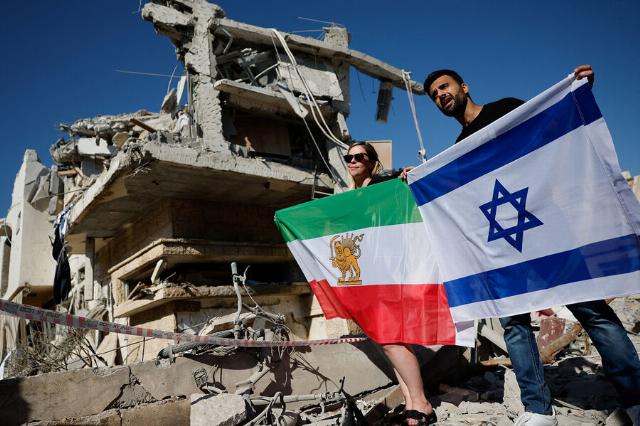Iran's Security Council confirms truce with Israel
Israel has agreed with US President Donald Trump's ceasefire initiative, as it believes that the objectives of Operation Rising Lion have been achieved. The Iranian Security Council also confirmed the truce with Israel. How the 12-day war ended and whether one of the sides can be considered a loser, the military observer of Gazeta argues.Ru", retired Colonel Mikhail Khodarenok.
Military results
The Iranian authorities have confirmed the truce with Israel. The Security Council of the Islamic Republic declared "a victory that made the enemy regret, admit defeat and unilaterally stop aggression." At the same time, Tehran promises to respond to any aggressive action by Israel.
In turn, Israeli Defense Minister Yisrael Katz ordered the country's Defense Army to respond decisively to Iran in case of violation of the ceasefire.
The office of the Prime Minister of the Jewish State, Benjamin Netanyahu, is confident that Israel has achieved all the goals of the military operation, eliminating the immediate existential double threat - in the nuclear sphere and in the field of ballistic missiles.
Indeed, the Israeli Armed Forces have achieved very impressive results in a very short time - the intelligence service of the Islamic Republic clearly failed to cope with any of the tasks assigned to it, the Iranian air defense system was defeated in a matter of hours and demonstrated zero effectiveness, the Tehran air force did not say a single intelligible word in this conflict, according to The enterprises of the missile and nuclear industries have suffered significant blows and their further functioning is currently in great doubt.
Most importantly, the Israeli Air Force gained complete air supremacy during the conflict and did not suffer any significant losses during the fighting. Iran's information about the downed Israeli planes has not yet been confirmed.
As for the losses directly on the territory of Israel from the attacks of Iranian ballistic missiles, they certainly exist. But it is obviously impossible to recognize them as large-scale and, moreover, catastrophic. Indirectly, this is evidenced by the small number of civilian casualties.
As for the recurring reports of the complete bankruptcy of the Iron Dome missile defense system during this conflict, this information is not entirely correct. In this regard, it should be noted that the main burden of the fight against Iranian missiles fell on the Arrow-2, 3, THAAD, and Patriot missile defense systems. And the Iron Dome refers to tactical missile defense systems, and is mainly designed to combat unguided rockets launched from the Gaza Strip. Of course, within the limits of its tactical and technical characteristics, the Dome participated in repelling attacks, but it played far from the main role.
Political outcomes
On the one hand, a cease-fire has been achieved during the conflict between Iran and Israel, but in any war, the main thing is not the cessation of the exchange of blows, but the political outcome. It is not yet clear what obligations Tehran is assuming in connection with the end of hostilities (or whether it is assuming anything at all).
Without this, it seems that the United States and Israel have no reason to believe that the 12-day campaign has led to the achievement of all their military and political goals.
Iran can restore all the destruction within a certain period of time, resume large-scale mass production of ballistic missiles, and reanimate nuclear industry enterprises. But now these objects should no longer be placed at the level of 90-100 meters of rocky soil, but deeper. In other words, it would be impossible to reach the nuclear industry enterprises of the Islamic Republic with any GBU-57 (American correctable bunker buster aircraft bomb). Such a course of events is quite possible.
What conclusions can be drawn?
As for the preliminary military-strategic results of the 12-day campaign, the following answer has been convincingly given once again: God has long been on the side of high technology rather than large battalions in modern armed conflicts.
And automatically, this statement is followed by the question: is it possible, in principle, for a state of medium territory and population to create modern high-tech armed forces with all the attributes necessary for a successful armed struggle (from an orbital grouping of spacecraft to strategic bombers), in order, if necessary, to go to war with the first powers of this world and fight on equal terms with them? Or will all this be a waste of few resources for such countries and the best way out of this situation is to join one of the military blocs and surrender part of their sovereignty to the overlord? However, the issue is more than debatable.
The opinion of the author may not coincide with the position of the editorial board.
Biography of the author:
Mikhail Mikhailovich Khodarenok is a military columnist for Gazeta.Ru", retired colonel.
He graduated from the Minsk Higher Engineering Anti-Aircraft Missile School (1976), the Military Air Defense Command Academy (1986).
Commander of the S-75 anti-aircraft missile division (1980-1983).
Deputy commander of the anti-aircraft missile regiment (1986-1988).
Senior Officer of the General Staff of the Air Defense Forces (1988-1992).
Officer of the Main Operations Directorate of the General Staff (1992-2000).
Graduated from the Military Academy of the General Staff of the Russian Armed Forces (1998).
Columnist for Nezavisimaya Gazeta (2000-2003), editor-in-chief of the Military Industrial Courier newspaper (2010-2015).
Mikhail Khodarenok


